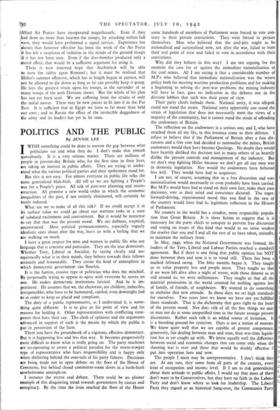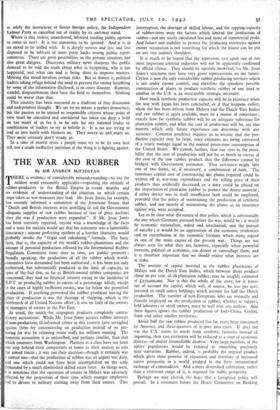POLITICS AND THE PUBLIC
By JENNIE LEE
IWISH something could be done to narrow the gap between what politicians say and what they do. I don't make that remark querulously. It is a very serious matter. There are millions of people in present-day Britain who, for the first time in their lives, are taking an interest in public affairs. They are trying to under- stand what the various political parties and their spokesmen stand for.
But this is not easy. For almost everyone in public life talks the same generalised blah-blah. All tell us we are fighting a People's war for a People's peace. All talk of post-war planning and recon- struction. All promise a new world order in which the economic inequalities of the past, if not entirely eliminated, will certainly be vastly reduced. What are we to make of all this talk? If we could accept it at its surface value we could go about our wartime tasks in a state of subdued excitement and contentment. But it would be nonsense to say that that was the present mood. We are dubious, sceptical, unconvinced. Most political pronouncements, especially vaguely idealistic ones about after the war, leave us with a feeling that we are walking on mush.
I have a great respect for men and women in public life who use language that is concrete and particular. They are the true democrats. Whether Tory, Liberal or Socialist, by saying clearly and un- equivocally what is in their minds, they behave towards their fellows seriously and honourably. They create the kind of atmosphere in which democratic government can flourish.
It is the furtive, evasive type of politician who does the mischief.
By perpetually trying to appear to agree with everyone he serves no one. He makes democratic institutions farcical. And he is im- pertinent. He assumes that we, the electorate, are children, imbeciles, irresponsibles who have to be humoured, cajoled, even downright lied to in order to keep us placid and compliant.
The duty of a public representative, as I understand it, is some- thing quite different. It is to give us his point of view and his reasons for holding it. Other representatives with conflicting view- points then have their say. The clash of opinions and the arguments advanced in support of each is the means by which the public is put in possession of the facts.
There you have the groundwork of a vigorous, effective democracy.
But it is happening less and less that way. It becomes progressively more difficult to know what is really going on. The party machines are co-operating to create a political paradise for the storm-trooper type of representative who fears responsibility and is happy only when sheltering behind the coat-tails of his party fiihrers. Decisions are being made not in open debate on the floor of the House of Commons, but behind closed committee-room doors in a hush-hush unwholesome atmosphere.
I instance the recent coal debate. There could be no plainer example of this disquieting trend towards government by caucus and conspiracy. By the time the issue reached the floor of the House
some hundreds of members of Parliament were forced to vote con- trary to their private convictions. They were forced to perjure themselves. Men who believed that the coal-pits ought to be nationalised and nationalised now, not after the war, failed to state their real point of view and failed to vote in accordance with their convictions.
Why did they behave in this way? I am not arguing for the moment the case for or against the immediate nationalisation of the coal mines. All I am saying' is that a considerable number of M.P.s who believed that immediate nationalisation was the wisest policy both for meeting wartime production problems and for making a beginning to solving the post-war problems the mining industry will have to face, gave no indication in the debates nor in the division lobbies that such was their point of view.
Their- party chiefs forbade them. National unity, it was alleged, could not stand the strain. National unity apparently can stand the
strain of legislation that does not necessarily meet the views of a majority of the community, but it cannot stand the strain of offending the coalowners of Britain.
The reflection on the coalowners is a serious one, and I, who have attacked them all my life, in this instance come to their defence. I refuse to believe that if the Parliament of Britain after a free dis- cussion and a free vote had decided to nationalise the mines, British coalowners would then have become Quislings. No doubt they would have heartily disliked the decision just as many others of us heartily dislike the present controls and management of the industry. But we don't stop fighting Hitler because we don't get all our own way in domestic legislation. Nor would the coalowners have behaved less well. They would have had to acquiesce.
I am not, of course, assuming that in a free discussion and vote nationalisation would necessarily or even probably have been carried. But M.P.s would have had to stand on their own feet, make their own decisions, vote as their mind and conscience dictated. The eager, forward-driving, experimental mood that you find in the rest of the country would have had its legitimate reflection in the Houses of Parliament.
No country in the world has a steadier, more responsible popula- tion than Great Britain. It is sheer fiction to suggest that it is necessary for the party chiefs to conspire to prevent free discussion and voting on issues of this kind that would in no sense weaken the resolve that you and I and all the rest of us have taken, unitedly, to maintain the military front.
In May, 1940, when the National Government was formed, the leaders of the Tory, Liberal and Labour Parties reached a standstill agreement. But if there is one thing that public opinion has NOT done between then and now it is to stand still. There has been a marked leftward swing. The blitz months began it. They taught us to value property less and people more. They taught us that if we were left alive after a night of terror, with those dearest to us still around us, we were millionaires. They taught us that all the material possessions in the world counted for nothing against loss of family, of friends, of neighbours. We wanted to do something to enshrine that new attitude. In those days we set high standards for ourselves. Two years later we know we have not yet fulfilled those standards. That is the dichotomy that goes right to the heart of the present mood. Nor does talk of all the fine things we may or may not do at some unspecified time in the future assuage present discontents. Rather such talk is an added source of irritation. It is a breeding ground for cynicism. Ours is not a nation of morons. We know quite well that we are capable of greater competence, generosity, fair dealing between man and man, than war-time legisla- tion has as yet caught up with. We know equally well the difference between social and economic changes that can come only when the shooting war is over and those that would be doubly effective if put into operation here and now.
The people I meet may be unrepresentative. I don't think they are. At any, rate, they come from all parts of the country, every kind of occupation and income level. If I am to risk generalising about their attitude to public affairs, I would say that most of them don't want to be Conservatives, but they have no faith in the Labour Party and don't know where to look for leadership. The Liberal Party they regard as an historical hang-over, the Communist Party
as solely the instrument of Soviet foreign policy, the Independent Labour Party as cancelled out of reaiity by its anti-war stand.
Where is this restive, unanchored, leftward tending public opinion to come to rest? It is too numerous to be ignored. And it is in no mood to be trifled with. It is deeply serious and less and less disposed to be tolerant of mere party hacks among public repre- sentatives. There are great possibilities in the present situation, but also great dangers. Disastrous military news sharpens the public demand to be told the truth about what is happening, why it has happened, and what can and is being done to improve matters. Meeting this mood involves certain risks. But to thwart it, political leaders taking refuge behind the need to prevent the enemy benefiting by some of the information disclosed, is to court disaster. Rumour, scandal, disgruntlement then have the field to themselves. Nothing could be worse than that.
This country has been nurtured in a tradition of free discussion and independent thought. We are by no means a perfect democracy, but the passion to be treated as responsible citizens whose point of view must be consulted and considered has taken too deep a hold on too many of us for it to be safe for any national leader or combination of leaders to try to belittle it. It is no use trying to lead us into battle with blinkers on. They worry us and anger us. They most certainly don't steady us.
In a time of mortal crisis a people must try to be its own best self, not a crude ineffective imitation of the thing it is fighting against.



























 Previous page
Previous page